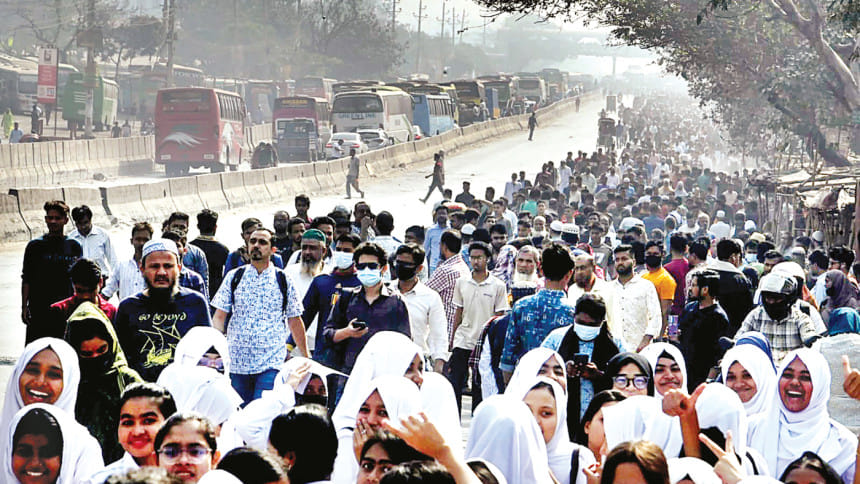Metered CNG fares: BRTA revokes ‘ill-planned’ directive

Bangladesh Road Transport Authority (BRTA) was compelled to withdraw its directive to Dhaka Metropolitan Police (DMP) to take legal action against CNG-run auto-rickshaws for disregarding government-set metered fares.
The decision came after many auto-rickshaw drivers abstained from work and blocked city streets for several hours since yesterday morning, causing immense sufferings to thousands of commuters.
In a hasty and poorly planned move, the BRTA attempted to enforce the fare system for CNG-run auto-rickshaws that was set nine years ago, without any review or necessary consultation with stakeholders.
In its immediate response, Bangladesh Jatri Kalyan Samity, a passenger welfare platform, issued a statement saying, "By withdrawing the directive, BRTA has effectively left helpless passengers at the mercy of rampaging CNG drivers across the city."
The drivers blocked key roads, including College Gate, Mirpur, and Pallabi, in protest against the government's decision. Some even besieged the BRTA headquarters in Banani.
As a result, thousands of commuters endured severe traffic congestion and a lack of available transport during office hours.
The Daily Star could not reach BRTA Chairman Mohammed Yasin, Road Transport and Highways Division Senior Secretary Ehsanul Hoque, or Road Transport and Bridges Adviser Muhammad Fouzul Kabir Khan for comments despite repeated attempts.
Between 2001 and 2004, the government allowed the registration of 13,000 environmentally friendly CNG-run auto-rickshaws as commercial vehicles, following the phasing out of 31,500 two-stroke three-wheelers in 2001.
The previous Awami League government later approved the registration of an additional 2,696 CNG-run three-wheelers for Dhaka, bringing the total to 15,696. However, many illegal CNG-run auto-rickshaws now operate on city roads.
In September 2015, the government fixed the fare for CNG-run auto-rickshaws, which came into effect on November 1 that year -- the last time the fare was revised.
At that time, the daily deposit -- a fee drivers must pay to vehicle owners -- was set at Tk 900.
However, CNG-run three-wheelers rarely adhere to the approved fare system, rendering the metered structure ineffective. Drivers often negotiate fares, frequently leading to disputes with passengers.
The drivers place the blame on vehicle owners, claiming they charge more than the fixed Tk 900 daily deposit, forcing them to ignore the metered fares.
In 2022, the BRTA initiated a revision of both the fare and deposit rates, considering the rise in gas prices and inflation. However, the effort failed as worker and owner representatives could not reach a consensus, a BRTA official said.
After the political changeover in August last year, the new leadership of CNG workers repeatedly urged the authorities, including the BRTA, to ensure that CNG owners adhered to the government-fixed deposit of Tk 900, according to BRTA and transport organisation sources.
On January 26, BRTA Director (Engineering) Sitangshu Shekhar Biswas wrote to the DMP Commissioner, urging legal action against any owner charging drivers above the fixed deposit rate.
According to Section 35(1) of the Road Transport Act 2018, an owner may face up to six months in jail or a fine of Tk 50,000 for not adhering to the fixed deposit amount, the letter stated.
A copy of the letter was forwarded to the Road Transport and Highways Division, the Home Ministry, police headquarters, and the Labour Directorate.
Following this, CNG owners pressured the BRTA, arguing that if drivers did not adhere to government-fixed fares, owners should not be expected to provide vehicles at a Tk 900 deposit, especially given inflation and rising gas prices.
The BRTA director subsequently wrote another letter to the DMP commissioner on February 10, requesting legal action against CNG-run auto-rickshaw drivers for disregarding government-set metered fares.
According to Section 35(3) of the Road Transport Act 2018, a driver may face up to six months in jail or a fine of Tk 50,000 for overcharging, the letter stated. A copy of the letter was forwarded to the same offices.
Golam Faruk, General Secretary of the Bangladesh CNG-run Auto-Rickshaw Light Vehicles Transport Workers Federation, alleged that owners charge between Tk 1,200 and Tk 1,600 -- far above the set deposit rate. He added that the cost of living had significantly increased since the government last revised the fare rate nine years ago.
"We've been demanding that the government revises the fare rate, but the BRTA suddenly issued the directive without any consultation with us," he told this correspondent yesterday.
Barkat Ullah Bhulu, Convener of Dhaka Mohanagar CNG-run Auto Rickshaw Owners Oikya Parishad, said they had been demanding an increase in the deposit rate since 2018, as gas prices had risen sharply.
A sub-committee was formed in 2022 to review both the fare and deposit rates, he said, adding that the committee submitted its report, with all members except one workers' association representative agreeing to the proposal. However, the then government delayed taking action on the issue.
He claimed that the BRTA issued the January 26 directive targeting owners due to pressure from the workers' association.
"Now, the BRTA is set to withdraw the directive as well."

 For all latest news, follow The Daily Star's Google News channel.
For all latest news, follow The Daily Star's Google News channel. 



Comments